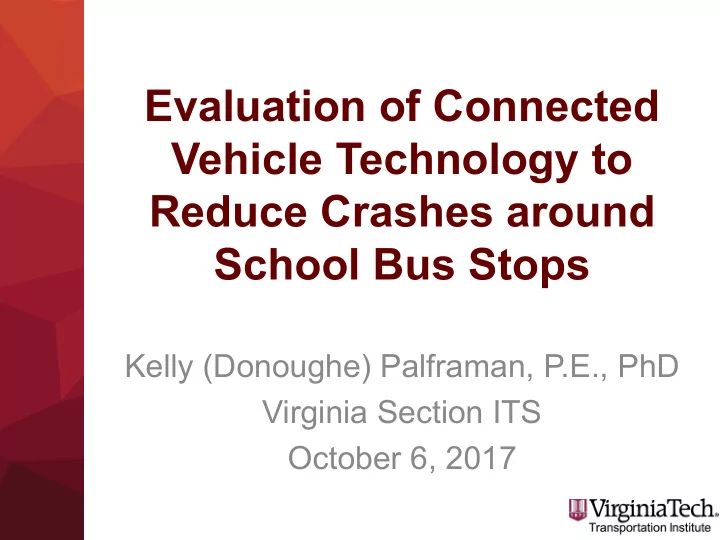

Evaluation of Connected Vehicle Technology to Reduce Crashes around School Bus Stops Kelly (Donoughe) Palframan, P.E., PhD Virginia Section ITS October 6, 2017
Format of Presentation • Background on School Transportation Issues and Practices • Understanding the Problem Introduction • Concept for a connected vehicle application to improve safety at school bus stops • Results of an experiment to evaluate Connected effectiveness of the application Vehicle App. Advancing Transportation Through Innovation 2
Introduction
Background on School Transportation • 450,000 public school buses travel approximately 4.3 billion annual miles to transport 23.5 million students • Accounts for 2% of school-aged motor vehicle fatalities and injuries • Students are vulnerable road users while waiting at bus stops. Advancing Transportation Through Innovation 4
Current State of the Practice • School Bus Stop Ahead Signs – Placed along curvy or hilly terrain or when sight is restricted – No active indicator when bus is present Advancing Transportation Through Innovation 5
Understanding the Problem Advancing Transportation Through Innovation 6
Improving Driver Awareness around School Buses and School Bus Stops: An Application of Connected Vehicle Technology
Research Objectives 1. Develop a concept for a CV system to improve driver awareness around stopped school buses 2. Evaluate drivers’ responses to an in- vehicle “School Bus Stopped Ahead” message and similar static roadside signing. Advancing Transportation Through Innovation 8
Concept of Operations Advancing Transportation Through Innovation 9
Concept of Operations 1. Messages presented to vehicles approaching an occupied school bus stop 2. Messages from school buses to other vehicles in the vicinity 3. Messages from stopped school buses to approaching vehicles Advancing Transportation Through Innovation 10
Concept of Operations 1. Messages presented to vehicles approaching an occupied school bus stop 2. Messages from school buses to other vehicles in the vicinity 3. Messages from stopped school buses to approaching vehicles Advancing Transportation Through Innovation 11
Methods for Evaluation Subject Matrix Male Female • 29 naïve subjects 20-35 years old 8 7 50-65 years old 7 7 • Experimental Conditions 1. Static roadside sign 2. In-vehicle message Advancing Transportation Through Innovation 12
Test Route • On-road testing • 2 laps (yellow/blue) • 1 condition per lap – Diamond = sign – Star = in-vehicle Advancing Transportation Through Innovation 13
Vehicle Setup • VTTI naturalistic data collection equipment • Camera Views • In-vehicle information system – Visual messages – Audible tones Advancing Transportation Through Innovation 14
Results • Comparisons of driver responses with respect to: – Speed – Longitudinal Acceleration – Jerk (change in accel) • All results were statistically significant • Direct comparisons between the sign and message were not performed. Advancing Transportation Through Innovation 15
Results – Speed Profile Roadside Sign In-vehicle Message * * Advancing Transportation Through Innovation 16
Results – Acceleration Profile Roadside Sign In-vehicle Message * * Advancing Transportation Through Innovation 17
Results – Jerk Profile Roadside Sign In-vehicle Message * * Advancing Transportation Through Innovation 18
Limitations • Bus stop locations contained intrinsically different characteristics – Design speed, sight distance • In-vehicle messaged deployed conservatively early – 3.0 seconds reaction time on straight segment of road • Naturalistic driving limitations – Novelty and observer effects Advancing Transportation Through Innovation 19
Conclusions • Developed and tested an in-vehicle message to warn drivers that they are approaching a stopped bus. – Nearly immediate driver response to the in- vehicle message – Dynamic response to the messages were numerically similar to the response after seeing a school bus – Drivers behaved conservatively after they received the message Advancing Transportation Through Innovation 20
Conclusions • The connected vehicle system has the potential to greatly improve safety around school buses. Advancing Transportation Through Innovation 21
Questions? Advancing Transportation Through Innovation
Recommend
More recommend